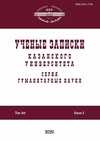Наконечники ножен прусских мечей эпохи викингов: происхождение и семантика изображений
The Prussian swords’ scabbard tips of the Viking Age: The origin and semantics of images
Author(s): Vladimir Ivanovich KulakovSubject(s): Archaeology, Semantics, 6th to 12th Centuries
Published by: Казанский (Приволжский) федеральный университет
Keywords: Southeastern Baltic; Prussians; Curonians; Scalvians; semantics; sword scabbard tips;
Summary/Abstract: The semantic analysis of the images on the Prussian swords’ scabbard tips of the Viking Age was performed, for the first time in Russian archaeology. The spread of various subtypes of sword scabbard tips in the Prussian settlements and adjacent areas was considered. The oldest tips, subtypes KIa and Kib, were the social markers (their owners were the noble retinue) and are known only from the burial grounds of Northern Sambia, where the retinue antiquities are especially numerous. Here, the tips with a pair of birds are also commonly found. They continue the tradition of using the bird-tipped scabbards to mark the retinue members. Subtypes KIIIb and KVa of the sword scabbard tips spread to the east of Sambia in the 11th century, thereby testifying that the Western Baltic warriors tried to seize control over the local river trade routes. When the veteran warriors left the retinue because of their age, they still carried their weapons as a social marker of their status. The weapons were also used as an element of the burial inventory. In the Prussian settlements, the tips of subtype KVb, Curonian in their origin, were relatively numerous only in Sambia. A few of them were found at the archaeological sites of the Masurian Lake District. This indicates that the Western Baltic tribes shared the same cult of sacred trees and placed the tree symbols on their sword scabbard tips.
Journal: Ученые записки Казанского университета. Серия Гуманитарные науки
- Issue Year: 163/2021
- Issue No: 3
- Page Range: 151-163
- Page Count: 13
- Language: Russian

